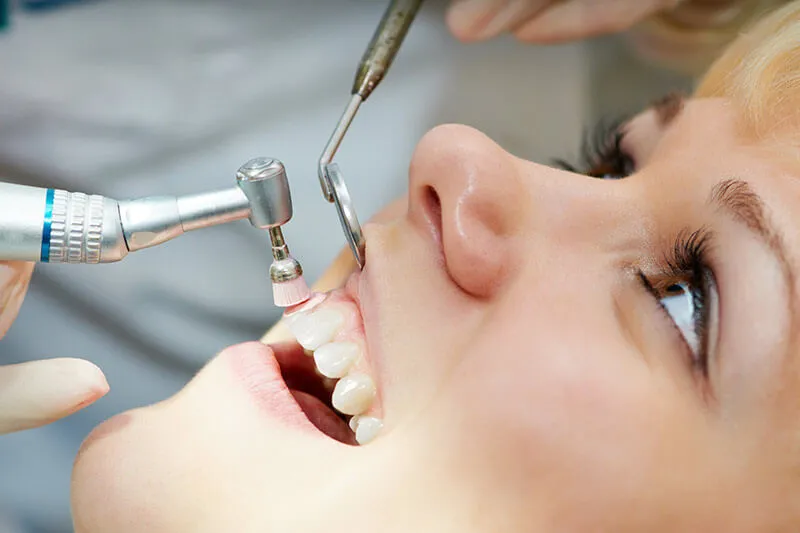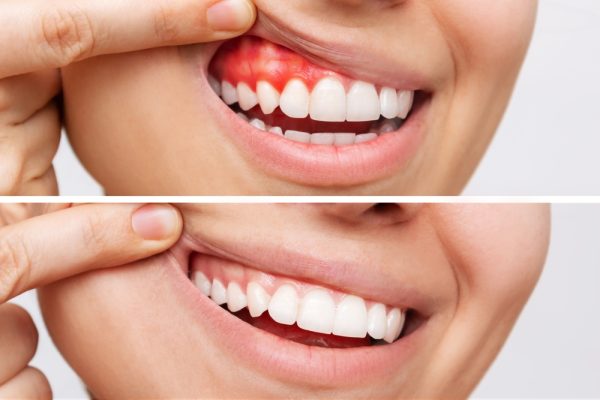
Gum Disease Treatment in Bakersfield
Gum disease, also known as periodontal disease, is a common dental condition that affects millions of people worldwide. It ranges from mild inflammation of the gums to severe damage to the soft tissue and bone that support the teeth. Fortunately, with proper diagnosis and treatment, gum disease can be managed effectively, preserving both oral health and overall well-being.

Signs and Symptoms:
Recognizing the signs and symptoms of gum disease is crucial for early detection and intervention. These may include:
- Red, swollen, or tender gums
- Bleeding gums, especially during brushing or flossing
- Receding gums, causing teeth to appear longer
- Persistent bad breath
- Loose or shifting teeth
- Changes in the fit of dentures

Causes of Gum Disease:
Gum disease typically develops due to poor oral hygiene habits that allow plaque, a sticky film of bacteria, to accumulate along the gumline. Factors that increase the risk of gum disease include smoking, hormonal changes, certain medications, diabetes, and genetic predisposition.
Types of Gum Disease:
- Gingivitis: This is the earliest stage of gum disease, characterized by inflammation of the gums. If left untreated, gingivitis can progress to more severe forms of periodontal disease.
- Periodontitis: In this stage, the inflammation extends below the gumline, causing damage to the supporting bone and tissues. Without intervention, periodontitis can lead to tooth loss.
Gum Disease Treatment:
Effective treatment for gum disease aims to reduce inflammation, eliminate infection, and restore gum and bone health. Treatment options may include:
- Professional Dental Cleaning: Removing plaque and tartar buildup through professional cleaning is essential for controlling gum disease.
- Scaling and Root Planing: This deep cleaning procedure involves removing plaque and tartar from below the gumline and smoothing the tooth roots to prevent bacterial reattachment.
- Antibiotic Therapy: Antibiotics, in the form of mouth rinses, gels, or oral medications, may be prescribed to control bacterial infection and promote healing.
- Surgical Intervention: In advanced cases of gum disease, surgical procedures such as flap surgery, bone grafting, or tissue regeneration may be necessary to repair damaged tissues and restore oral health.
Prevention:
Preventing gum disease starts with practicing good oral hygiene habits, including:
- Brushing teeth twice a day with fluoride toothpaste.
- Flossing daily to remove plaque from between teeth and along the gumline.
- Visiting the dentist regularly for professional cleanings and oral exams.
- Avoiding tobacco use and maintaining a healthy lifestyle.
Google Verified Patient Reviews
 ceneathea jackson2025-03-31
ceneathea jackson2025-03-31 Frankie Padilla2025-01-28Setting to get a check up at the dental
Frankie Padilla2025-01-28Setting to get a check up at the dental Nick Brewer2024-12-11I’m usually always freaking out when I go to the dentist even just for a cleaning but south H dental has the best staff. Everyone is always nice and friendly they also thoroughly explain each thing they do and make sure I’m comfortable with each step and make sure I’m in no pain at all. There’s no other dentist I’ll go to now that I’ve experienced the hospitality South H Dental provides. If you like feeling surrounded by family who cares for you this is the dentist for you!!
Nick Brewer2024-12-11I’m usually always freaking out when I go to the dentist even just for a cleaning but south H dental has the best staff. Everyone is always nice and friendly they also thoroughly explain each thing they do and make sure I’m comfortable with each step and make sure I’m in no pain at all. There’s no other dentist I’ll go to now that I’ve experienced the hospitality South H Dental provides. If you like feeling surrounded by family who cares for you this is the dentist for you!! Leslie Viviana2024-11-22I finally found a dental office that I'm sticking too! The customer services is expectacular! The staff demonstrate professionalism and remember the patient's names and make you feel valued. The staff is always welcoming and respectful. The Dr's are very well experienced and provide high quality services. I would recommend this office for anyone looking for a positive dental experience!
Leslie Viviana2024-11-22I finally found a dental office that I'm sticking too! The customer services is expectacular! The staff demonstrate professionalism and remember the patient's names and make you feel valued. The staff is always welcoming and respectful. The Dr's are very well experienced and provide high quality services. I would recommend this office for anyone looking for a positive dental experience! Corina Garibay2024-11-22Wow what a great dental office! I have always had a fear of the dentist due to prior childhood dental offices/dentists visits, but I felt very comfortable. The staff was amazing, the dentists walked me through the procedures that were going to be done for the appointment, and overall the environment was very calming and relaxing. I have recommended this place to all my family and friends
Corina Garibay2024-11-22Wow what a great dental office! I have always had a fear of the dentist due to prior childhood dental offices/dentists visits, but I felt very comfortable. The staff was amazing, the dentists walked me through the procedures that were going to be done for the appointment, and overall the environment was very calming and relaxing. I have recommended this place to all my family and friends Miriam Arias2024-11-22I’ve been a patient at South H Dental for over 10 years. They have treated my 4 kids and myself. Staff is always friendly and welcoming. I recommend them for all your dental needs from cleaning to braces.
Miriam Arias2024-11-22I’ve been a patient at South H Dental for over 10 years. They have treated my 4 kids and myself. Staff is always friendly and welcoming. I recommend them for all your dental needs from cleaning to braces. Javier Medina2024-04-17Staff was really nice and professional, Doctor did a great job, I recommend. Thank you South H Dental!Load more
Javier Medina2024-04-17Staff was really nice and professional, Doctor did a great job, I recommend. Thank you South H Dental!Load more
